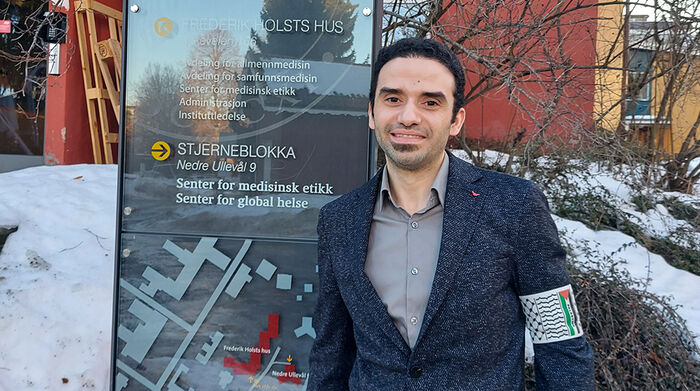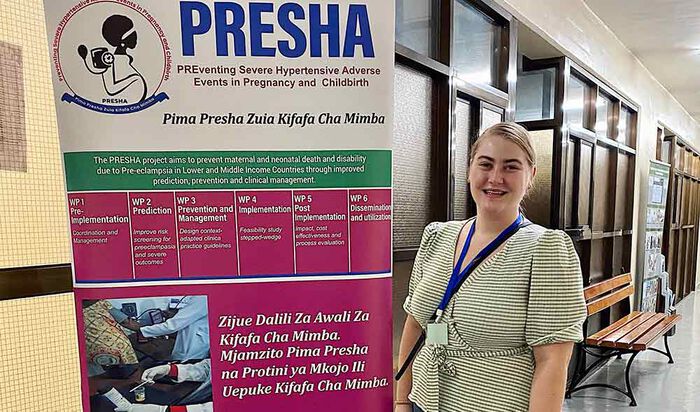New students starting in 2026 will choose between a research track and a thematic track where students on the research track will do fieldwork and students on the thematic track can take a semester at a university abroad.
Fieldwork and semester abroad for class 2025 and earlier classes
Fieldwork gives you an opportunity to practically engage in your specialized thematic area and research methodology of your choice. You can test out the basic community- and global health knowledge you gained during your first year, and gain real world experiences. In addition, you can build skills and competencies in engaging with the community and other relevant stakeholders through the implementation of your project. Below you can read about student’s own experiences during fieldwork, and get inspired.
-
Master project focuses on parents of children with eczema and second skin infections
Change of staff led to a growing frustration among the parents. An ongoing research project investigates how parents experience the management of their children’s eczema in Greenland.
-
Fieldwork on dental care in Hargeisa, Somaliland
Abdelrahman Eid Mohamed Ismail Dahroug travelled to Hargeisa in Somaliland to collect data on dental caries status and related risk factors of children in primary schools.
-
Research fieldwork about maternity care in Tanzania
– My background is in development studies and I am passionate about research around women's health - specifically the social aspects, says Merete Graneng.
-
Travel for fieldwork during your master’s degree in International Community Health
Students at the master’s program in International Community Health at the University of Oslo spend a semester doing fieldwork. Learn more about Professor Heidi Fjeld’s fieldwork in South-Asia.
Master research projects and data sets
Master thesis projects can also be conducted on already collected data. You may get access to data sets that support your topic of interest either through an ongoing research project at the Department, or through research projects in collaborative institutions.
-
Collecting register data on bone fractures in Norway
Conducting master research is challenging and fulfilling process. Sepideh Semsarian did a cohort study on forearm fractures where she used register data from Norway of 143,476 patients treated in Norwegian hospitals between 2008-2019.
You can find more master projects and be inspired by looking at: DUO - UIOs research archive
Support for fieldwork travel expenses
The Institute of Health and Society (HELSAM) provide modest financial support for students pursing master’s degree programme at the institute, to facilitate fieldwork activities outside the EU/EEA related to their thesis.
Master Thesis Award
The award intends to recognize an outstanding thesis of a graduate of master in International Community Health programme at the Institute of Health and Society.
Exchange Agreements
As a student at the master's programme in International Community Health, you have the opportunity to take advantage of the exchange agreements available through your department, in addition to the general agreements offered by the University of Oslo.
When can I go?
Exchange is recommended as early as the second semester. Therefore, it is important to get in touch with a student advisor at an early stage.
Pre-approval requirement
In the Master's program in International Community Health, there is a requirement that courses must be pre-approved. The program must confirm that the exchange can be approved as part of your degree at UiO, which is also important in order to receive support from the Norwegian State Educational Loan Fund (L?nekassen).
How do I apply?
You apply for exchange through S?knadsWeb. The deadline is February 15 for the autumn semester and September 15 for the spring semester.
Please contact your student adviser for further information on the exchange admission process.
Fieldwork and semester abroad for class 2026 and onwards
If you choose to do the research track (60 credit master thesis) it is a requirement to do a research fieldwork in the third semester, either abroad or in Norway. If you choose the thematic track (30 credit master thesis) you have the opportunity to spend the third semester at a university abroad.
Fieldwork - research track
Fieldwork gives you an opportunity to practically engage in your specialized thematic area and research methodology of your choice. You can test out the basic community- and global health knowledge you gained during your first year, and gain real world experiences. In addition, you can build skills and competencies in engaging with the community and other relevant stakeholders through the implementation of your project. Below you can read about student’s own experiences during fieldwork, and get inspired.
-
Master project focuses on parents of children with eczema and second skin infections
Change of staff led to a growing frustration among the parents. An ongoing research project investigates how parents experience the management of their children’s eczema in Greenland.
-
Fieldwork on dental care in Hargeisa, Somaliland
Abdelrahman Eid Mohamed Ismail Dahroug travelled to Hargeisa in Somaliland to collect data on dental caries status and related risk factors of children in primary schools.
-
Research fieldwork about maternity care in Tanzania
– My background is in development studies and I am passionate about research around women's health - specifically the social aspects, says Merete Graneng.
-
Travel for fieldwork during your master’s degree in International Community Health
Students at the master’s program in International Community Health at the University of Oslo spend a semester doing fieldwork. Learn more about Professor Heidi Fjeld’s fieldwork in South-Asia.
Support for fieldwork travel expenses
The Institute of Health and Society (HELSAM) provide modest financial support for students pursing master’s degree programme at the institute, to facilitate fieldwork activities outside the EU/EEA related to their thesis.
Master Thesis Award
The award intends to recognize an outstanding thesis of a graduate of master in International Community Health programme at the Institute of Health and Society.
Thematic track
Students pursuing the thematic track in the ICH programme shall spend the third semester to complete selected thematic elective courses of interest. The elective courses will provide the student with a total of 30 credit points The students may select relevant thematic courses offered by the programme or those offered by other programmes within the University of Oslo or other universities.
Students in the thematic track may also choose to spend this semester at a university abroad through available exchange agreements.
Exchange Agreements
As a student at the master's programme in International Community Health, you have the opportunity to take advantage of the exchange agreements available through your department, in addition to the general agreements offered by the University of Oslo.
When can I go?
Exchange is recommended as early as the second semester. Therefore, it is important to get in touch with a student advisor at an early stage.
Pre-approval requirement
In the Master's program in International Community Health, there is a requirement that courses must be pre-approved. The program must confirm that the exchange can be approved as part of your degree at UiO, which is also important in order to receive support from the Norwegian State Educational Loan Fund (L?nekassen).
How do I apply?
You apply for exchange through S?knadsWeb. The deadline is February 15 for the autumn semester and September 15 for the spring semester.
Please contact your student adviser for further information on the exchange admission process.
Master research projects and data sets
Since the thematic track contend a thesis project of 30 credits, it is recommended to do literature reviews or base the project on data sets. You may get access to data sets that support your topic of interest either through an ongoing research project at the Department, or through research projects in collaborative institutions.
-
Collecting register data on bone fractures in Norway
Conducting master research is challenging and fulfilling process. Sepideh Semsarian did a cohort study on forearm fractures where she used register data from Norway of 143,476 patients treated in Norwegian hospitals between 2008-2019.
You can find more master projects and be inspired by looking at: DUO - UIOs research archive
Master Thesis Award
The award intends to recognize an outstanding thesis of a graduate of master in International Community Health programme at the Institute of Health and Society.




